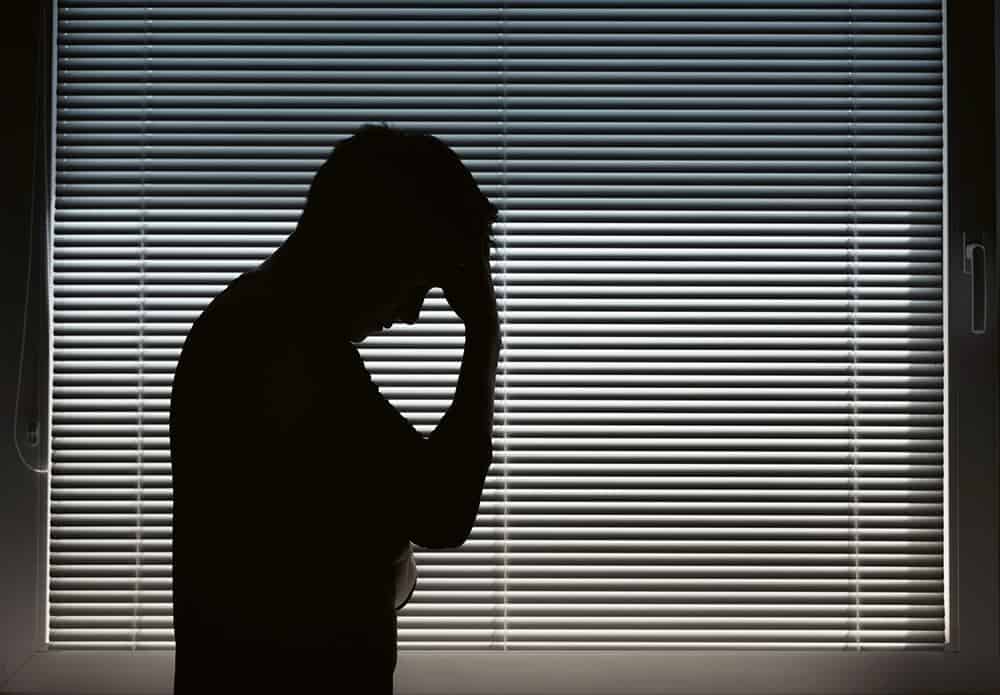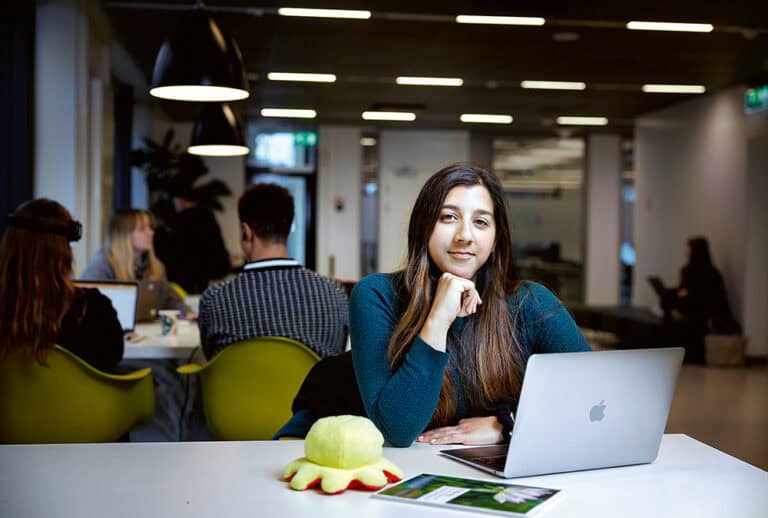Michael, a PhD student, pushes open the door to his study and sinks into his chair. He has never felt as insecure as he does right now. After problems with his funding, he has been unsure for a long time whether there will be a research project to work on this spring. Before the end of the year, he got the go-ahead to take part in a new project and was feeling pretty good. Now he has just found out that the position he believed he had been promised is being advertised.
That feeling of positivity has now been replaced by helplessness and resignation. ”My contract runs out soon, and at this point I still have no idea what will happen after that,” he says.
In fact, Michael’s mental health has been declining since 2021, when his residence permit needed to be renewed. He first came to Sweden in 2017 for a master’s programme. After working while studying, he started a doctoral programme in 2021. When he submitted his application for a new residence permit, the Swedish Migration Agency decided that the family, which in addition to Michael consists of his wife and their child, must go back to their home country and wait there for the decision.
This was in the middle of the pandemic, and Michael’s child was not even a year old. Fortunately, he was able to take parental leave, so at least he didn’t have to worry about what would happen with his doctoral studies in the meantime. One of the reasons he had left his home country in the first place was that he feels unsafe there. Ideologically, he explains, he is viewed as going against the grain for various reasons.
After a couple of months of limbo – living in uncertainty while staying with various relatives – the family was able to return to Sweden, where they faced the chaos of moving. Just as the news of the unwanted trip back to their home country arrived, the family had signed a contract for a new flat, so that Michael would not have to commute so far to work. In a semi-panic, he dumped the keys to both homes with acquaintances, who had to help carry boxes and furniture from one flat to the other.
Although it was a relief to come back to Sweden, his poor mental health started to escalate and also affect him physically. Michael found it hard to sleep, had stomach problems and experienced rapid mood swings. This affected his family, and he found it difficult to concentrate at work. “I worry about how the stress is seeping into our home environment and affecting my four-year-old.”
Before the trip, Michael had realised that he needed help and had contacted the university’s occupational health service. “But it didn’t help me very much. I was given very routine and general advice, like go for a walk, go swimming or spend time with my friends.”
Depending on how long he needs to endure the uncertainty about his new contract, it may well be that his mood dips even further, he thinks, and he ought to actually contact the health service again. “I’m a bit unsure about where to go, but above all I don’t have the time. I just keep thinking that I’ll ‘do it next week’. I have a lot of responsibility for my family. My wife doesn’t speak the language or English, so I often have to be the one to take our child to activities, to the doctor and to pre-school.”
Michael doesn’t know if he will ever find his way back to a stable mental state. Even though he felt better for a while, before the news that he wouldn’t get the employment contract he was expecting, the stress was still there. “I don’t feel much better mentally, even when there are positive changes in my situation. And I don’t know why,” he says.
In a cold meeting room in another part of Sweden, Sofia, a PhD student, tells us with some resignation in her voice that she will not still be in academia in six months’ time. She cannot go on. “I honestly think I will feel better as soon as I have finished my doctorate,” she says.

Sofia came to Sweden to study for a master’s degree in 2017 and started her doctoral programme in 2020. Almost immediately, she was in an accident and was injured so badly that she had to take sick leave. When she returned to work, the coronavirus pandemic had begun, and Sofia felt herself falling behind in her doctoral programme right from the start.
Her mental health issues accelerated. She saw a psychologist and was diagnosed with depression. Since then, she has been taking anti-depressants and anti-anxiety medication. “Before I started my doctoral studies, I was happy,” she says, “and my friends would definitely say they saw me as a positive person. Now I’m definitely more pessimistic, critical and actually rather cynical.”
She still describes herself as depressed, but she feels like she is at least on the right track. Over time, she has gained more understanding of her condition and developed strategies for dealing with her depression. One of her major problems is quality of sleep, she says. After eight hours of sleep, Sofia might wake up feeling like she hasn’t slept at all. Doctors have told her that it is stress-related, so she tries to stick to routines when it comes to mealtimes, bedtimes and physical exercise. In that way, she can function reasonably well in the day-to-day.
The aim is to finish her thesis in six months. It will be tough, as she has been behind during almost the entire doctoral programme. When the next six months are over, she doesn’t know what will happen, except that she will leave academia.
“When I look back on this time, it’s a miracle that I haven’t given up already. The reason I haven’t is because I enjoy my job. I like doing research and I have set a lot of personal goals that I want to achieve.”
Sofia believes that the poor mental wellbeing that tends to affect some PhD students is due to them being at the bottom of the pyramid. As a PhD student, you are dependent on others and don’t have much power over your situation. Above all, a PhD student is very dependent on their supervisor, she explains. Of course, most supervisors are good, she realises, but it risks being an unusual situation.
“And it’s even worse for us PhD students who come from other countries, because we also have to rely on getting a certificate from the supervisor to get our residence permits. Although I know that most supervisors would not use that as an instrument of power or a weapon, the possibility is still always there.”
Right now, Sofia is waiting for a residence permit after her old one expired. She has currently been waiting for five months. She is not able to leave Sweden, so she hasn’t visited her family for a long time.
She is not sure she would have wanted to stay in academia even if she had not suffered mental health problems. She describes her workplace as too exclusionary. “It’s simply not a good work environment. I don’t know what it’s like in other research fields, but in mine, at this university, it’s not a good place for either women or employees from other countries.”

PhD student Helena arrived in Sweden in autumn 2020, in the middle of the pandemic. She believes she has a year and a half left to complete her doctorate. During her initial doctoral studies, she felt fine, although in retrospect there were several red flags. There were a number of work environment issues, she says.
It was when Russia started the war in Ukraine in the spring of 2022 that she really felt her mental health start to deteriorate. Her mind was occupied with thoughts of relatives and parents living in the middle of an ongoing conflict. It was impossible to focus on her doctoral studies. Helena tried to renegotiate her contract with the university and take time off, but her employer did not oblige. Eventually, she was put on sick leave for burnout for about a year.
“I had to learn the Swedish system the hard way, you could say. It’s still difficult for me to go to the doctor. You get interrogated about your condition. They tell you to take a pill, rest or go for a walk. But it didn´t work for me.”
After six months, she was put in touch with a psychologist, which worked better for her. Looking back, Helena can see that she was suffering from depression even before the war started. She was having problems with her supervisor, whom she describes as manipulative. Also, she lacked both support and information about where to seek help and how the Swedish system works.
She now feels much better and, most importantly, she has a new supervisor. But she is not sure that she will ever be completely well again.
“I won’t be able to function in academia as I did before, anyway. I won’t be able to write as well, and I won’t be able to put in the same amount of effort.”
Helena is not sure what the future holds. The term has just started.
“There have been some changes at management level, and I have a new supervisor and several new colleagues who care more about each other and the work environment,” Helena says. “But it took me two years to be able to walk into the office and feel ok again.”
Footnote: Michael, Sofia and Helena are named something else.
PhD students have worse mental wellbeing than students
A study published in 2022 by the Research Institute of Industrial Economics (IFN), shows that the mental health of PhD students deteriorates during their doctoral studies. When compared with master’s students, the increase is greater. Among PhD students, the prevalence of mental health issues is highest during the fourth and fifth years of their programmes.
Platform to prevent mental health problems
A digital platform, Wellbeing in Academia, offers PhD students at Lund University help and support to improve their mental health. It contains information on strategies to prevent mental ill-health and where PhD students who experience symptoms can seek support. The contents of the platform are also available in a printed version.
Are you feeling unwell?
If you are experiencing mental health issues, contact a psychiatric emergency room or call 112.
If you need help with where to seek care, call 1177.
You can also contact the PhD student ombudsman or the occupational health service at your university.

















